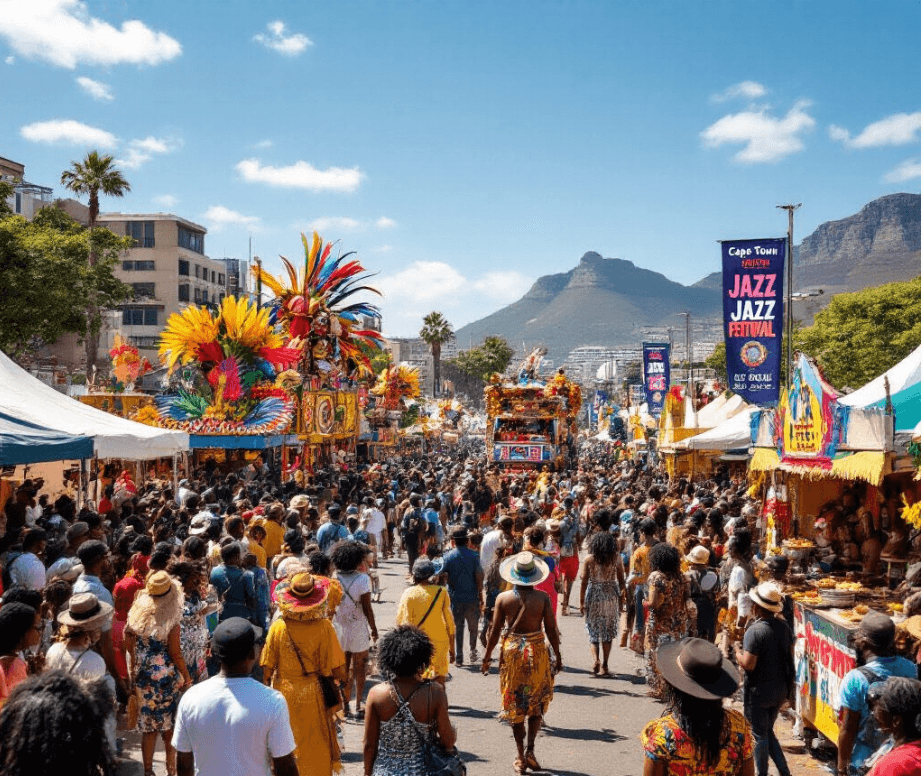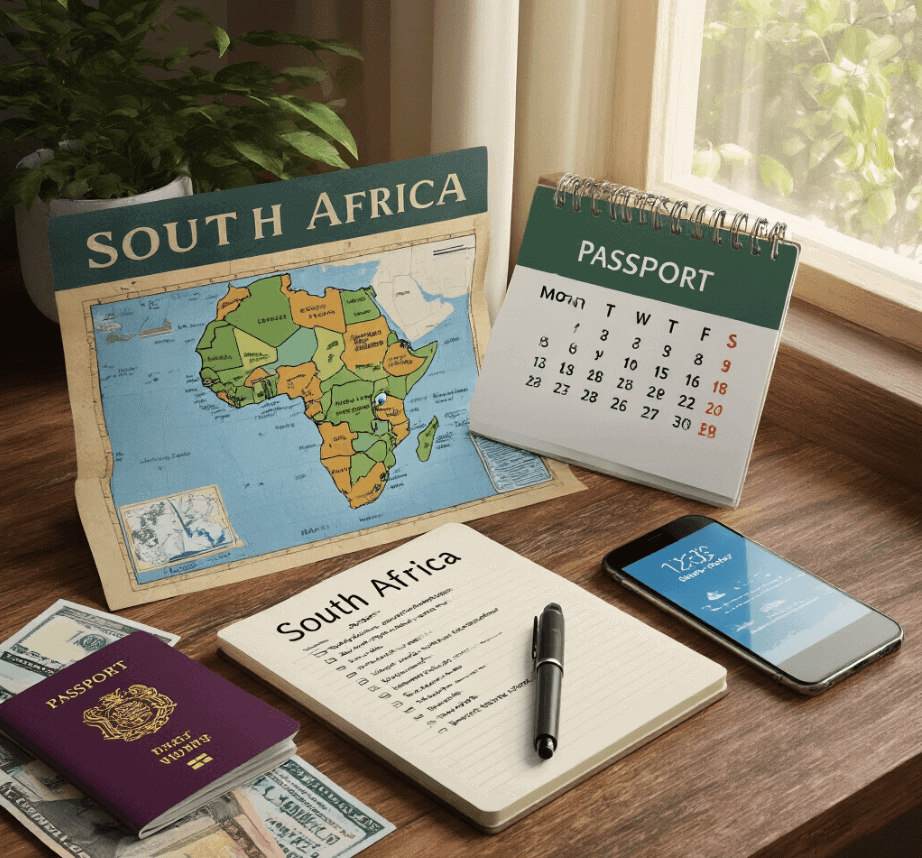Find out the best time to visit South Africa for epic safaris, vibrant beaches, and budget-friendly travel. Plan your trip with our season-by-season guide. Go from May to September for wildlife viewing. Visit from November to February for beach days. Explore Kruger, Cape Town, and more!
Editor’s View
Timing your trip shapes your experience with South Africa’s year-round adventure destination. Seasons transform South Africa’s landscapes, wildlife, and coasts. I’ve trekked Kruger’s trails. I’ve soaked up Cape Town’s beaches and shores. I’ve also sipped wine in Stellenbosch across seasons. Imagine a sunrise safari in Kruger, lions prowling through golden grass. Or relaxing on Cape Town’s pristine. Here’s your guide to planning the perfect South African adventure.
Table of Contents
South Africa’s Safari Seasons: When Wildlife Viewing is at its Peak

A.Dry Winter Months: Ideal for Game Viewing (May-September)
Winter (May-September) is safari paradise. Dry conditions thin vegetation, making animals easy to spot. Wildlife flocks to waterholes, creating unforgettable sightings. Elephants, zebras, and impalas gather at the same spots. Daytime temperatures hit 75°F (24°C), keeping animals active.
Fewer mosquitoes and no storms mean smooth game drives. Visit Kruger National Park for the best experience.
Table: Winter Safari Highlights
| Month | Temperature (°F/°C) | Wildlife Viewing | Pros | Cons |
|---|---|---|---|---|
| May | 50-77 / 10-25 | Great | Fewer crowds, dry trails | Cool mornings |
| June-July | 46-75 / 8-24 | Excellent | Prime animal sightings | School holidays |
| August | 50-79 / 10-26 | Excellent | Clear views, low prices | Chilly nights |
B. The Great Migration Period
South Africa lacks Serengeti-style migrations. But winter brings mini-migrations in reserves like Pilanesberg. Wildebeest and zebra herds move to water sources. These movements create dynamic safari moments. You’ll see animals on the go, not just standing still.
C. Baby Animal Season:
When to See Newborns: Visit from November to February for baby animals. Summer rains turn South Africa into a wildlife nursery. Impala lambs, zebra foals, and lion cubs steal the show. Early morning drives offer the best sightings before the heat kicks in. It’s a must for animal lovers.
D. Avoiding Crowds: Off-Peak Safari Months
Vegetation is thin in October, and April’s landscapes start drying out. October and April are safari sweet spots. These shoulder months offer great wildlife viewing with fewer crowds. Prices drop, and sightings feel private. You’ll avoid the chaos of peak-season game drives.
Morning game drives need a jacket, but afternoons are perfectly pleasant. Plus, you’ll often have sightings all to yourself—no jostling with twenty other vehicles at a lion sighting.
Coastal Paradise: Best Times for Beach Experiences

Summer Beach Season (November-February)
South Africa’s beaches shine in summer (November-February). Water temperatures reach 64-75°F (18-24°C), ideal for swimming. Cape Town’s Clifton and Durban’s Golden Mile buzz with life. December-January is peak season with hot, sunny days. Book early to dodge high prices and crowds. November or February offers similar weather with fewer tourists.
Table: Summer Beach Conditions
| Month | Water Temp (°F/°C) | Crowds | Pros | Cons |
|---|---|---|---|---|
| November | 64-70 / 18-21 | Moderate | Warm water, fewer crowds | Book early |
| December | 68-75 / 20-24 | High | Perfect beach weather | High prices |
| January | 68-75 / 20-24 | High | Sunny, vibrant vibe | Crowded |
| February | 66-73 / 19-23 | Moderate | Warm, less busy | Some rain |
Whale Watching Windows (June-November)
South Africa offers world-class whale watching. These include Southern right whales visit the Western Cape from July to October and Humpback whales June-November around St Lucia. The Southern right is called a ‘right whale’ because it was easy to catch. It was highly valued for its meat and oil content.
Hermanus is ideal—spot whales from shore. September’s Hermanus Whale Festival adds festive fun. Expect breaches and tail slaps.
When to Avoid Coastal Storms
The Western Cape is hit with winter storms from May to August. Strong winds and downpours disrupt beach plans. KwaZulu-Natal, on the other hand, faces heavy rains and cyclone risks from February to April. April-May and September-October offer calm weather and fewer crowds. The ocean be cooler, but beaches are quieter, and prices drop.
Weather Patterns Across South African Regions

Kruger National Park’s Climate Calendar
Ever wondered why wildlife viewing changes dramatically with the seasons in Kruger? The park experiences distinct wet and dry periods that completely transform the safari experience.
Kruger’s weather defines your safari. Dry winters (May-September) bring 46-79°F (8-26°C) and sparse vegetation. Animals gather at waterholes, making Big Five sightings easy. Wet summers (October-April) hit 90-100°F (32-38°C) with lush greenery. Animals scatter, but newborns add charm. Afternoon storms create stunning backdrops.
Cape Town’s Unique Mediterranean Climate
Cape Town marches to its weather beat. While Kruger bakes, it could be drizzling Cape Town.
Cape Town has a Mediterranean climate. Summers (December-February) are hot and dry, with 59-81°F (15-27°C). It’s perfect for Camps Bay. Winters (June-August) bring rain and 45-64°F (7-18°C). Expect dramatic Table Mountain clouds. Shoulder seasons (March-May, September-November) offer mild weather and fewer crowds.
The Garden Route’s Weather Sweet Spots
The Garden Route enjoys mild weather year-round. Temperatures range from 59-77°F (15-25°C) in summer and 45-66°F (7-19°C) in winter. Rainfall is even, with slight peaks in spring and autumn. Swim in protected bays anytime. Lush forests make it a year-round gem.
Johannesburg and Highveld Seasonal Variations
Johannesburg’s high altitude (5,751 ft) creates crisp air. Summers (November-February) hit 77-86°F (25-30°C) with daily thunderstorms. Winters (May-August) are sunny, with 61-68°F (16-20°C) days and near-freezing nights. Pack layers for chilly evenings. Golden grasslands add winter beauty.
Coastal vs. Inland Temperature Differences
The temperature gap between South Africa’s coasts and the interior can be shocking if you’re unprepared.
Coastal areas stay mild due to ocean influence. For instance, Durban’s Indian Ocean waters rarely drop below 68°F (20°C). The Atlantic’s Benguela current keeps Cape Town cooler. Inland areas like the Karoo swing from 104°F (40°C) days to 41°F (5°C) nights. Plan for extreme temperature shifts.
Budget-Friendly Travel Periods

Low Season Bargains (May-August)
Travel on a budget? May through August is your golden ticket to enjoying South Africa without emptying your wallet. Winter cuts accommodation prices by 30-40%. Safari lodges drop from $400 to under $250 per night. City hotels offer steep discounts. Wildlife viewing peaks as animals gather at waterholes. Crowds are thin, and reservations are easy. Pack warm layers for chilly mornings.
The crowds? Practically non-existent. You’ll have entire sections of national parks to yourself, and restaurant reservations become unnecessary luxuries.
Table: Low Season Savings
| Category | Peak Season Price | Low Season Price | Savings |
|---|---|---|---|
| Safari Lodge | $400+/night | $250/night | 30-40% |
| City Hotel | $150+/night | $90/night | 40% |
| Coastal Rental | $200+/night | $100/night | 50% |
Shoulder Season Value (April & September-October)
When we talk about perfect timing, April and September-October balance cost and comfort. The weather is pleasant, with 59-81°F (15-27°C). Safaris are near-perfect as vegetation thins. Coastal areas offer beach days with fewer crowds. Prices are 15-25% lower than peak season. Book flights 2-5 months out for deals.
Holiday Surcharges to Avoid
The Festive seasons like Christmas and New Year skyrocket prices. Avoid December 15-January 15 for sky-high prices. Easter and July school holidays spike costs. Public holidays like Heritage Day (September 24) add 20-30% surcharges. Check South Africa’s public holiday calendar and shift dates to save.
Flight Price Fluctuations Throughout the Year
January-February offers post-holiday deals. July-August flights cost more due to global summer demand. Flight prices vary widely from North American flights are cheapest 4-5 months out, European ones 2-3 months out. One-stop flights via Middle Eastern or European hubs save 30-40%. Tuesday/Wednesday departures are cheapest.
Tuesday and Wednesday departures consistently show the lowest prices regardless of season.
Special Events & Festivals Worth Planning Around

Cultural Celebrations Enhancing Your Visit
The Cape Town Jazz Festival in March draws global artists. April’s Klein Karoo National Arts Festival in Oudtshoorn showcases local talent. These are some of South Africa’s festivals. January’s Cape Town Minstrel Carnival dazzles with colorful parades. September’s Zulu Reed Dance offers cultural immersion.
If you’re planning your trip, try to catch the Cape Town Jazz Festival in March. It’s Africa’s grandest jazz event. This festival draws performers from across the globe. Music lovers, this one’s non-negotiable.
Wildlife-Focused Annual Events
The Hermanus Whale Festival in September/October celebrates whales with eco-activities. June’s National Arts Festival in Grahamstown features wildlife exhibitions. September’s Hoedspruit Endangered Species Festival highlights rhino and wild dog conservation.
For Wildlife enthusiasts, mark your calendars! Enjoy music and environmental activities. Experience the best land-based whale watching on earth.
Related Post 15 Hidden Tourist Attractions in South Africa You Must Visit
Food and Wine Festival Calendar
July’s Franschhoek Bastille Festival offers wine and gourmet food. October’s Stellenbosch Wine Festival showcases 300+ wines. September’s Soweto Wine Festival blends wine and township flavors. Knysna’s Oyster Festival in July is a seafood lover’s dream. Oyster fans, it’s ten days of seafood feasting. Enjoy sporting events and wine pairings along the Garden Route. This food scene shines brightest during South Africa’s culinary festivals.
Practical Season-by-Season Planning Guide

Summer Visitor Advantages & Challenges (Dec-Feb)
Summer in South Africa hits different December-February), bursts with life. Cape Town’s beaches become social hotspots while Durban’s Golden Mile hits 70-79°F (21-26°C). It’s ideal for swimming. Beach lovers, this is your time!
Safaris are lush but trickier due to dense vegetation. Baby animals add charm. Expect adorable newborn impalas, zebras, and other wildlife taking their first wobbly steps. Crowds peak in December-January, doubling prices. Book 6 months ahead. Afternoon storms in Kruger create dramatic scenes but can disrupt drives.
The downside? Everyone wants in. This season brings crowds of international travelers and local holidaymakers, sending prices skyrocketing. Book accommodations at least 6 months ahead or prepare for disappointment.
Fall Travel Benefits (Mar-May)
Fall (March-May) is a hidden gem. Crowds thin after Easter, and prices drop 30%. Temperatures range from 59-81°F (15-27°C). Safaris improve as vegetation thins. Cape Winelands glow with autumn hues. Beaches stay warm into April. Drakensberg and Garden Route trails shine with fall colors.
Winter Safari Magic (Jun-Aug)
Winter (June-August) is safari heaven. Dry conditions draw animals to waterholes. Thin vegetation reveals leopards in trees. Mornings dip to freezing, but days hit 68-77°F (20-25°C). Cape Town’s winter rains create dramatic seascapes. Coastal accommodations drop 50%. Avoid June/July school holidays for a better deal.
Mornings can be harsh, with temperatures sometimes dropping to freezing in places like Kruger. Yet, smart travelers layer up for dawn drives. They then shed clothes as days warm to a pleasant 20-25°C. Pack gloves and beanies for those chilly pre-dawn game drive starts.
Spring Bloom Period (Sep-Nov)
Spring (September-November) dazzles with wildflowers in the Northern Cape. Wildlife viewing stays strong, with baby animals appearing. Temperatures range from 59-86°F (15-30°C). Cape Town’s Table Mountain clears up, and beaches warm. Prices remain reasonable. Early September lodges offer shoulder-season specials.
Holiday Season Considerations (Dec-Jan)
December-January is festive but hectic. Coastal towns like Plettenberg Bay triple in size. Beaches host concerts and markets. Prices soar—book a year ahead. Safaris offer “green season” discounts. Cape Town enjoys sunny 59-81°F (15-27°C), while Kruger sees afternoon storms.

South Africa offers year-round adventures. Winter (May-September) is best for safaris, with animals at waterholes. Summer (November-February) shines for beaches, but shoulder seasons (March-May, September-October) balance weather, crowds, and costs. Budget travelers should target May-August for low-season deals. Plan around festivals like the Hermanus Whale Festival or Stellenbosch Wine Festival for extra flair. Check South Africa’s holiday calendar to avoid surcharges. Book flights 2-5 months out and choose Tuesday/Wednesday departures to save. Pack for varied weather—layers for winter safaris, swimsuits for summer beaches. South Africa rewards smart timing. Plan around safaris, beaches, or budgets for an unforgettable trip.
Related Post:10 Best Budget Hotels in Cape Town for Every Traveler
FAQs: Best Time to Visit South Africa
1. What’s the best time for a safari in South Africa?
Winter (May-September) is ideal. Dry conditions thin vegetation, and animals gather at waterholes, making sightings easier. Kruger and Pilanesberg are top spots.
2. When should I visit for South Africa’s beaches?
Summer (November-February) offers warm water (64-75°F) and sunny days. Clifton and Durban’s Golden Mile are perfect. November or February avoids peak crowds.
3. How can I save money on my South Africa trip?
Travel in low season (May-August) for 30-40% off accommodations. Shoulder seasons (April, September-October) offer 15-25% savings. Book flights 2-5 months out and avoid holidays like Heritage Day.
4. When is whale watching best in South Africa?
July-October is prime for southern right whales in Hermanus. Humpbacks June-November around St Lucia. September’s Hermanus Whale Festival is a highlight.
5. What’s the weather like in Cape Town vs. Kruger?
Cape Town has a Mediterranean climate: dry summers (59-81°F) and rainy winters (45-64°F). Kruger’s winters are dry (46-79°F), while summers are hot (90-100°F) with storms. Check forecasts for both regions.
6. Are there festivals worth planning my trip around?
Yes! You can try the Cape Town Jazz Festival in March. Another choice is the Franschhoek Bastille Festival in July. For October, consider the Stellenbosch Wine Festival. These events offer cultural and culinary experiences.




![Easiest Digital Nomad Visa in Europe: Top 5 Options for Remote Workers [2025 Guide] 11 Read more about the article Easiest Digital Nomad Visa in Europe: Top 5 Options for Remote Workers [2025 Guide]](https://tripsafarinow.com/wp-content/uploads/2025/09/image-300x225.png)
Pingback: How To Find Cheap Flights In 2025: A Comprehensive Step-by-Step Guide